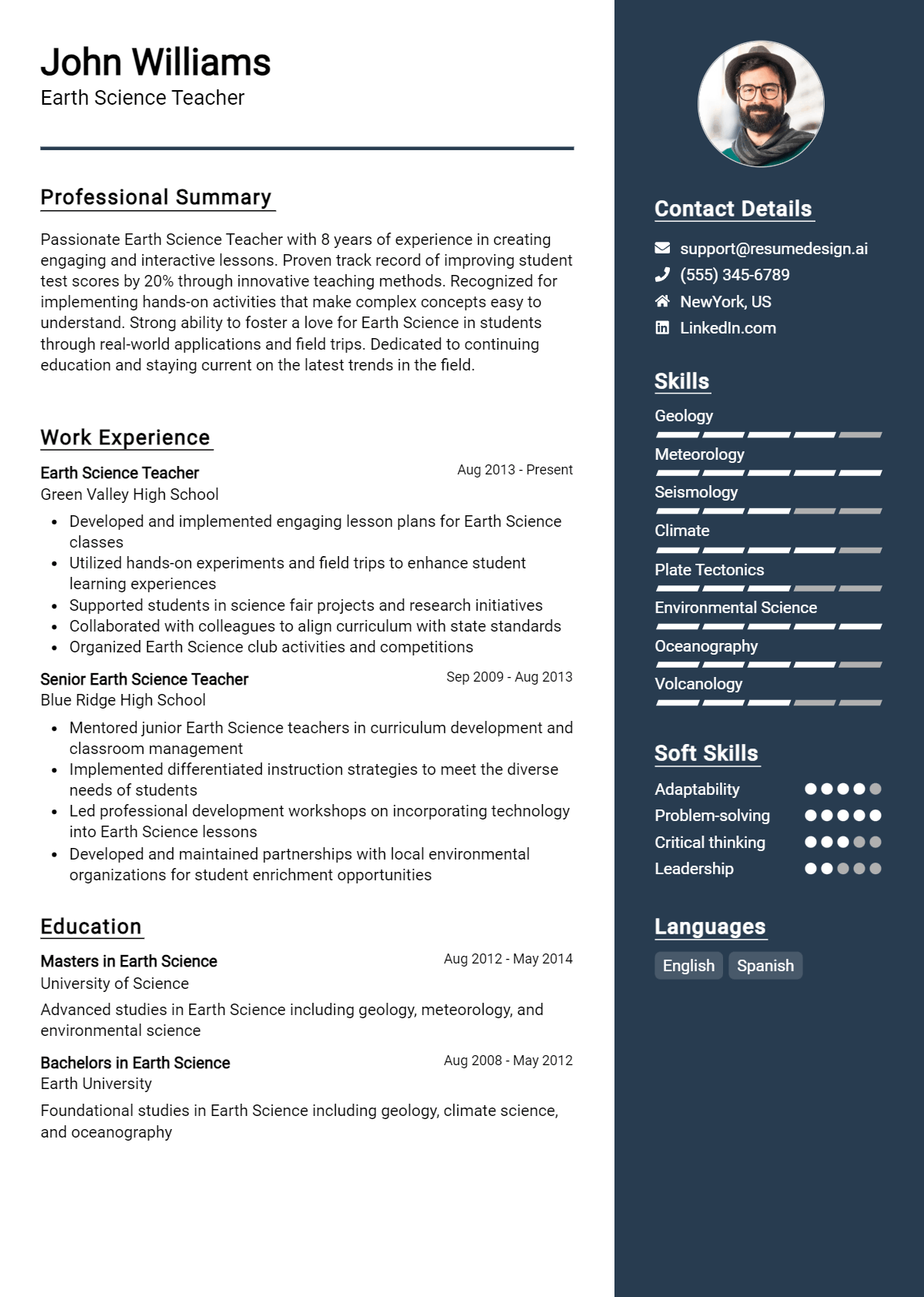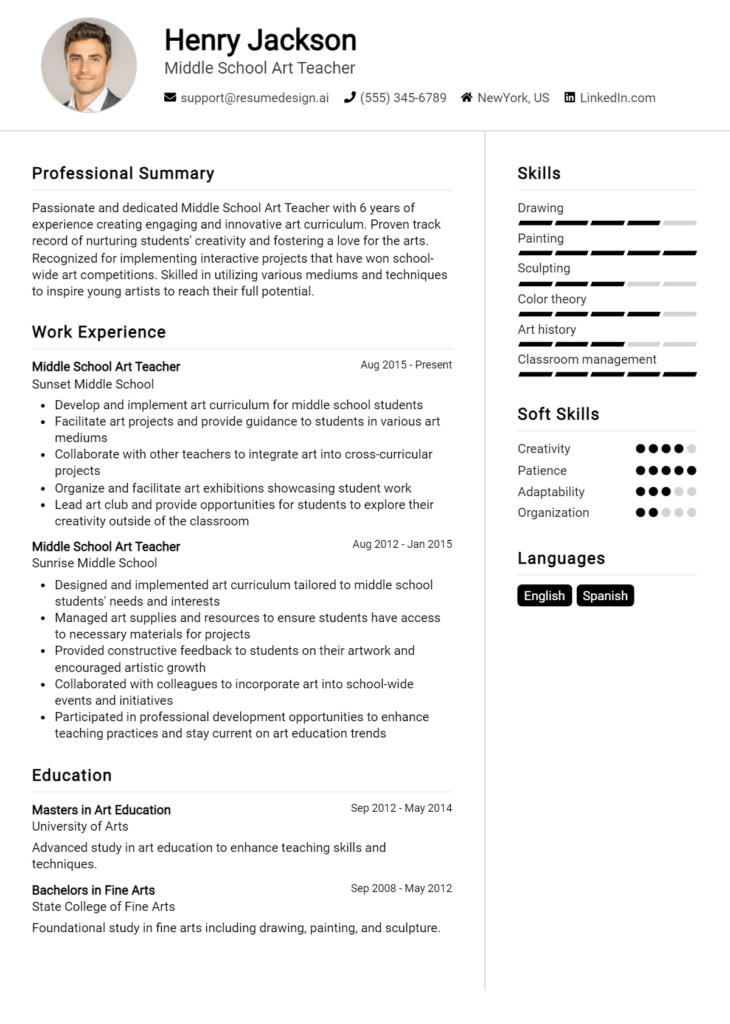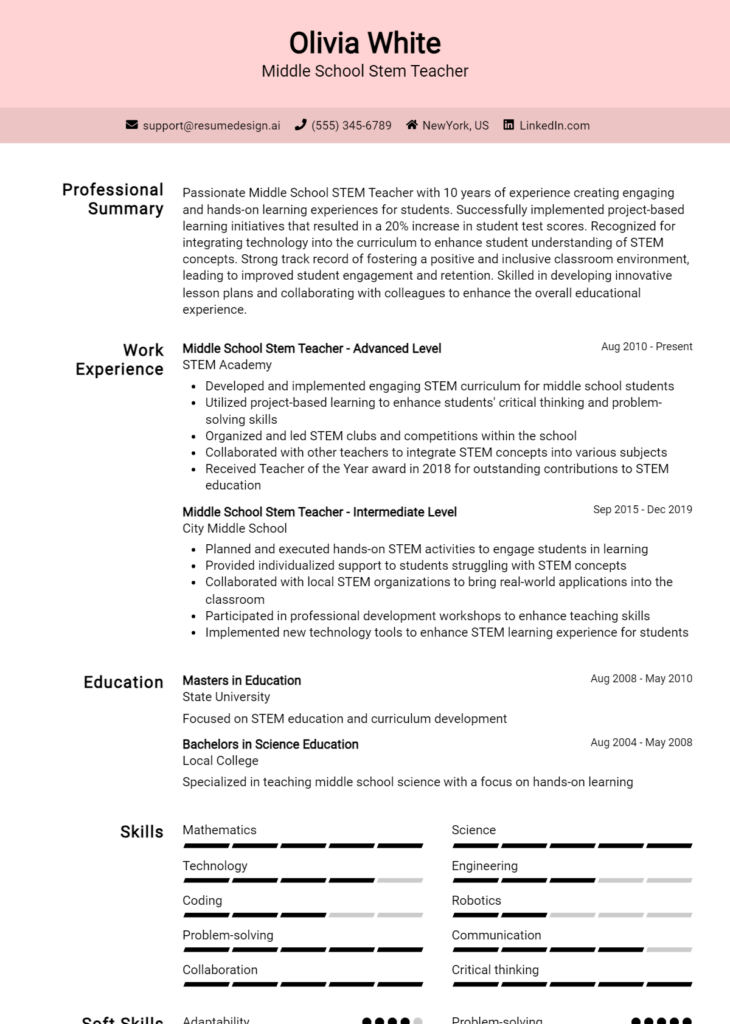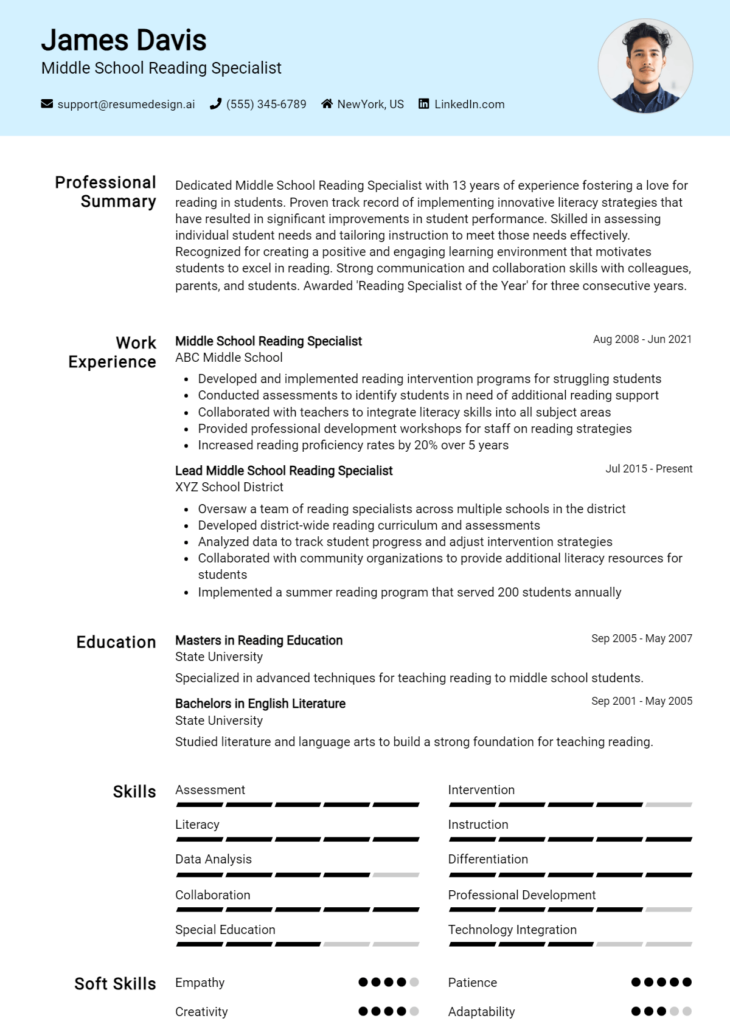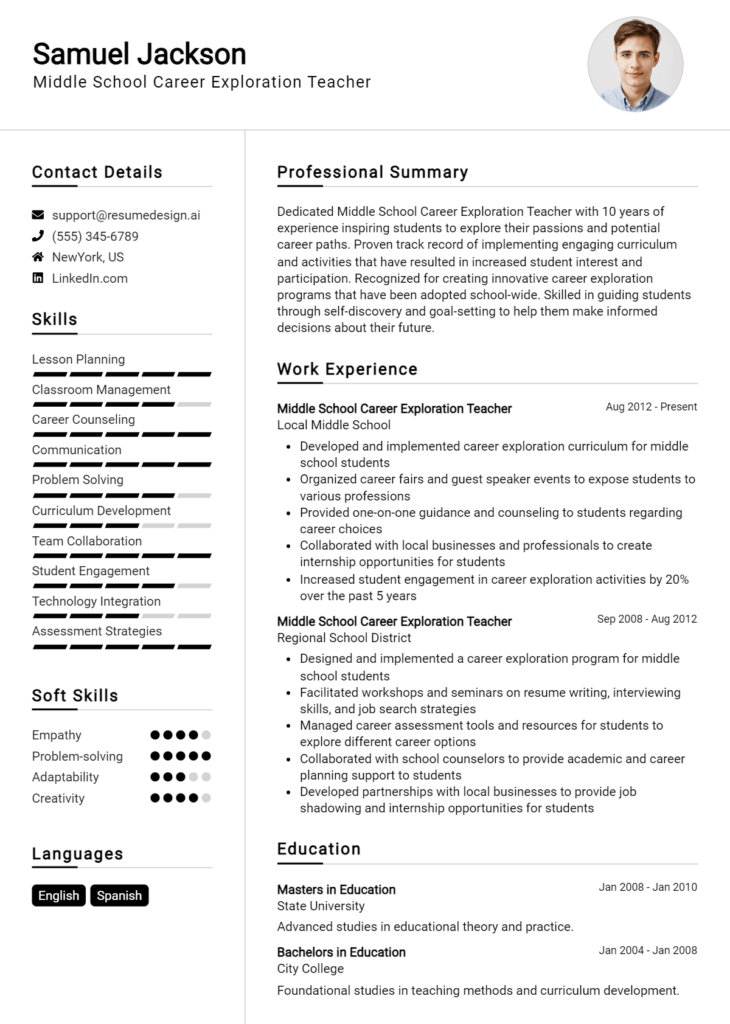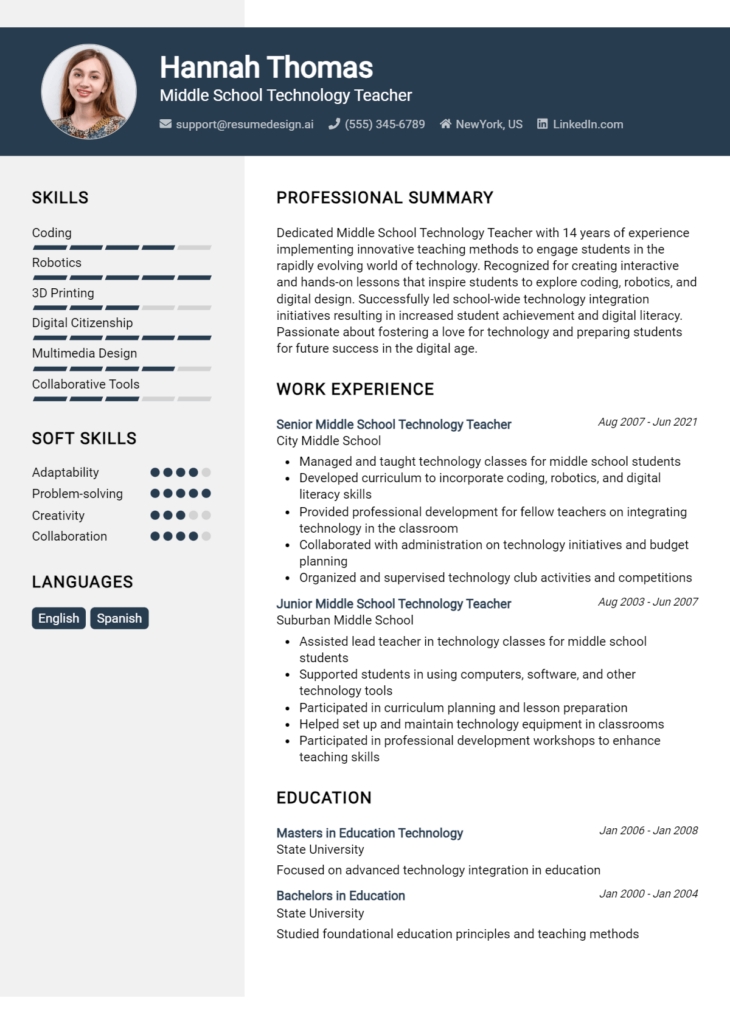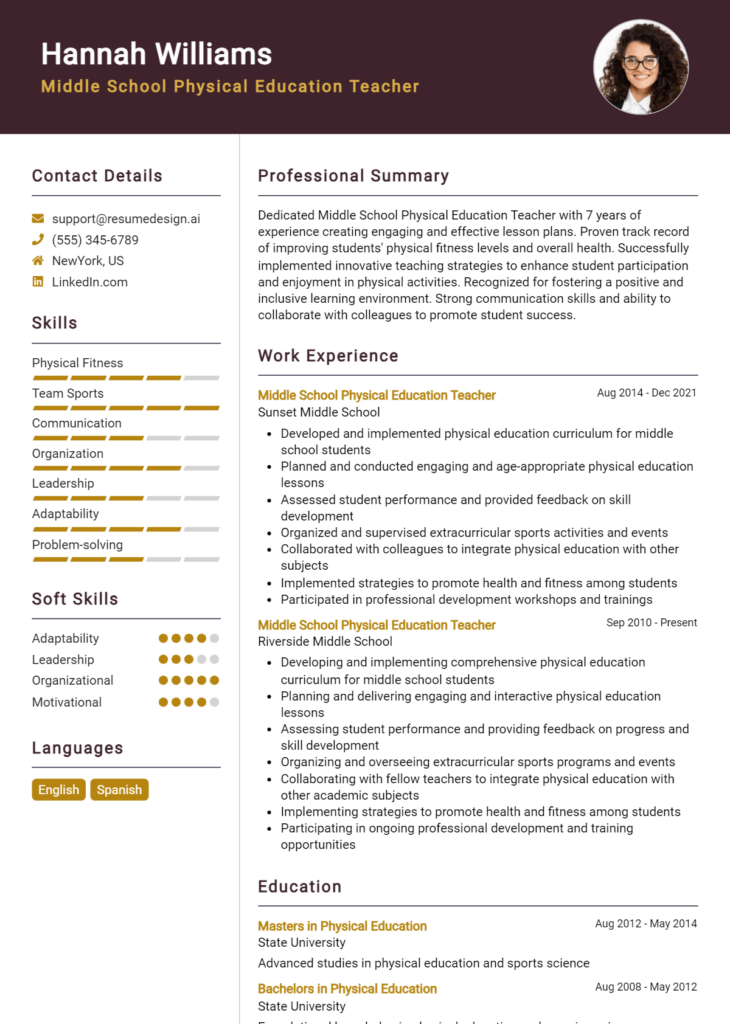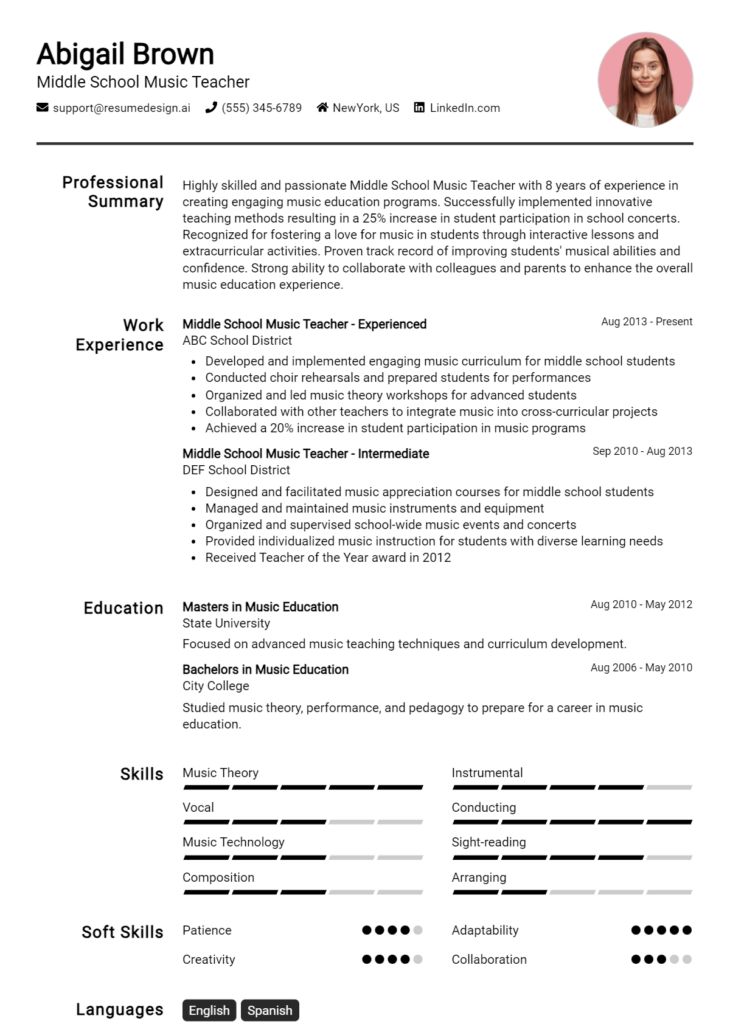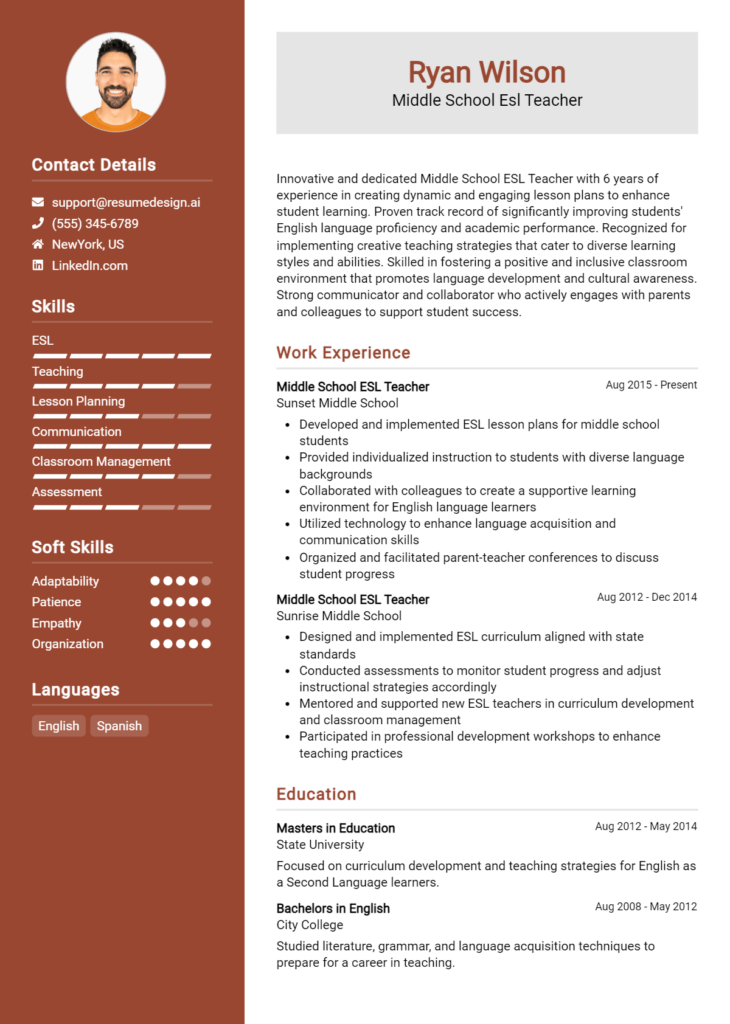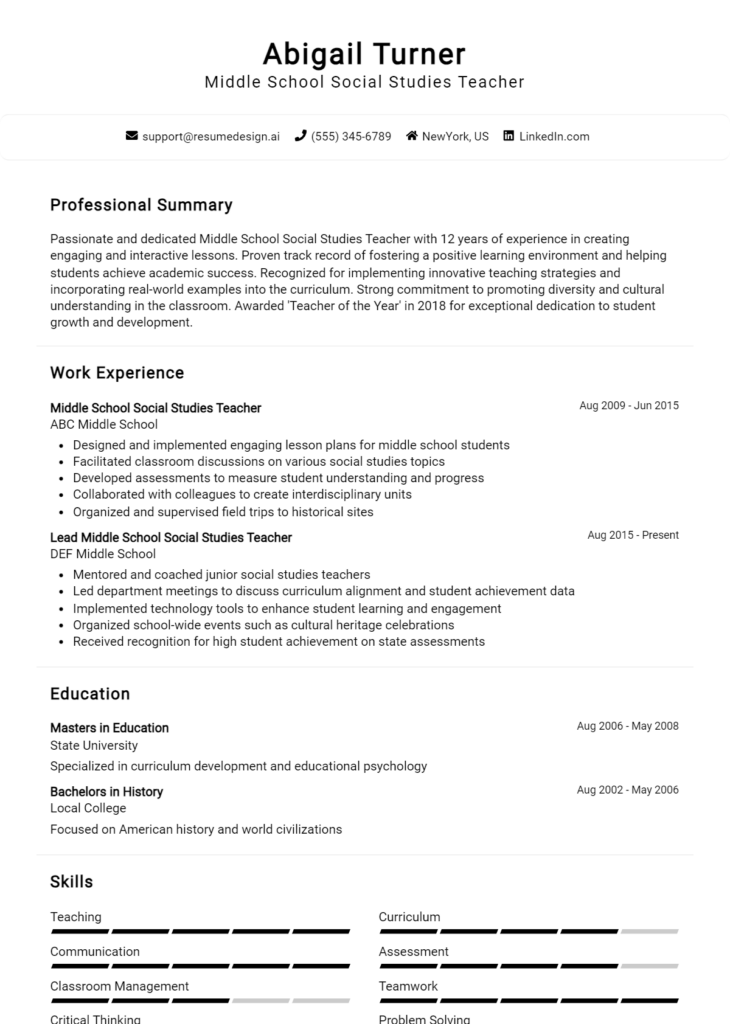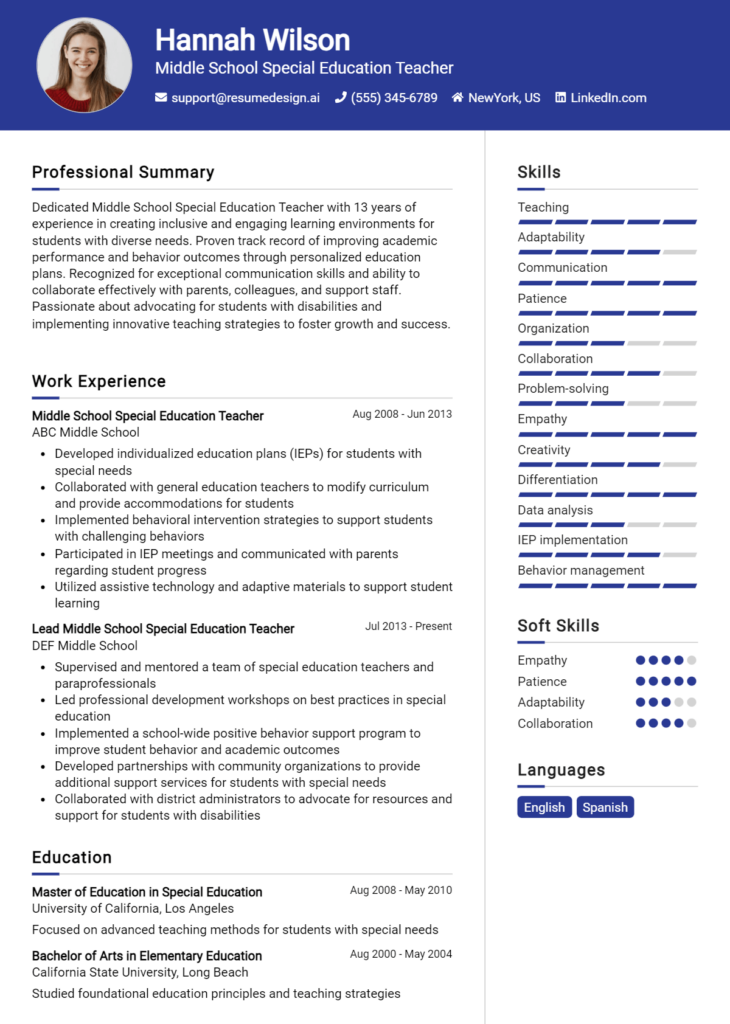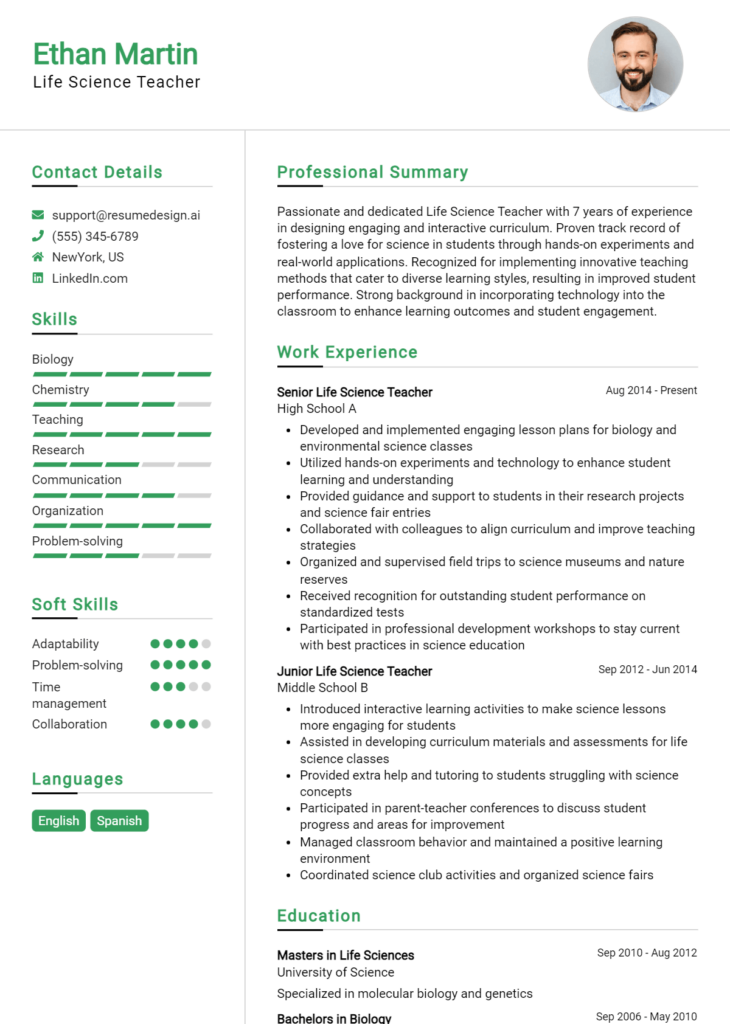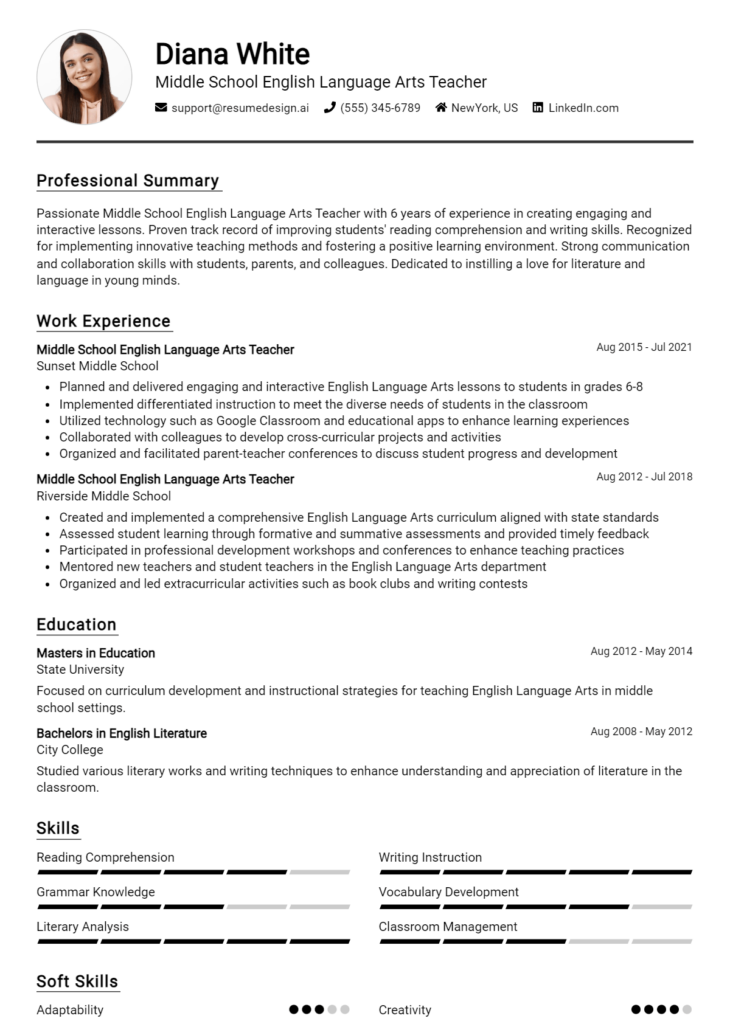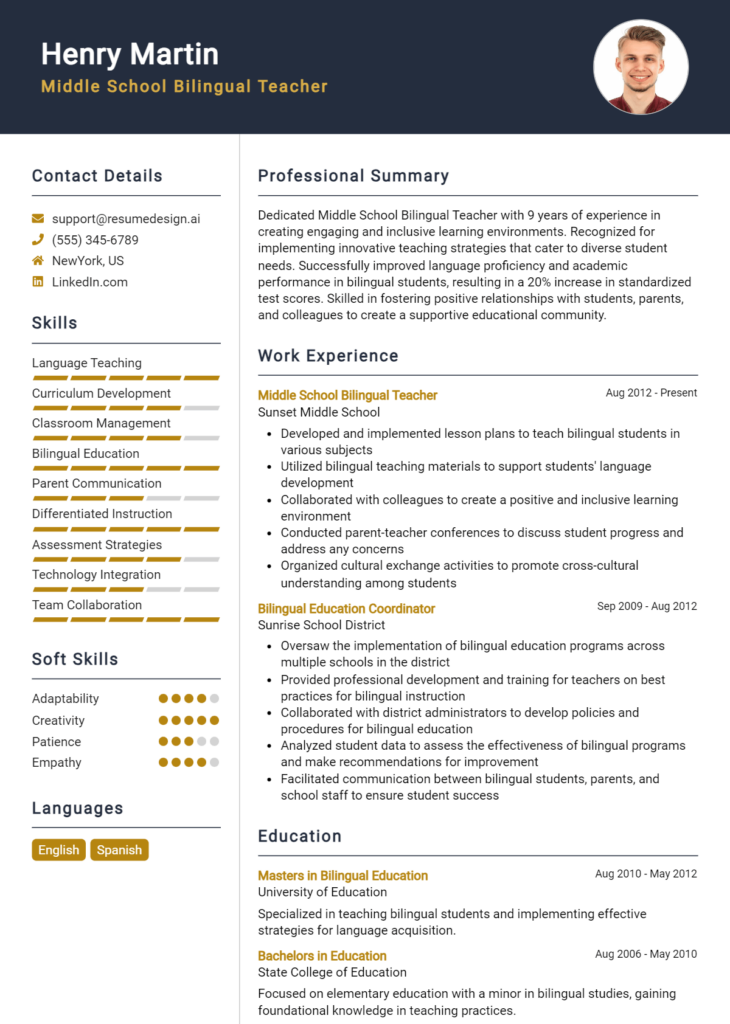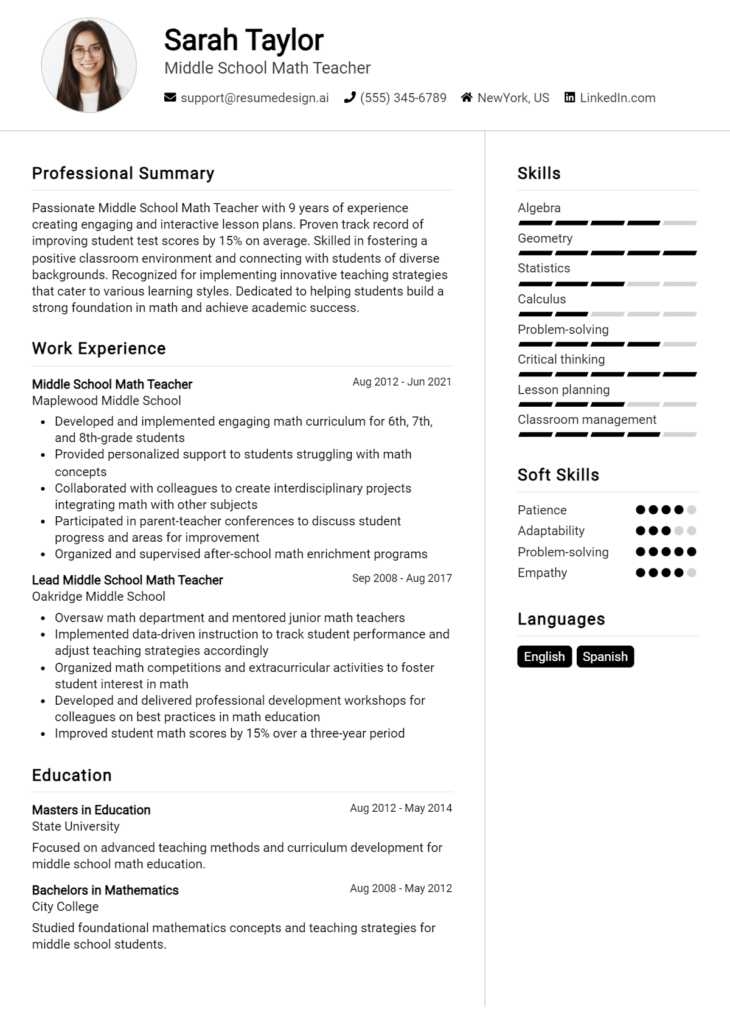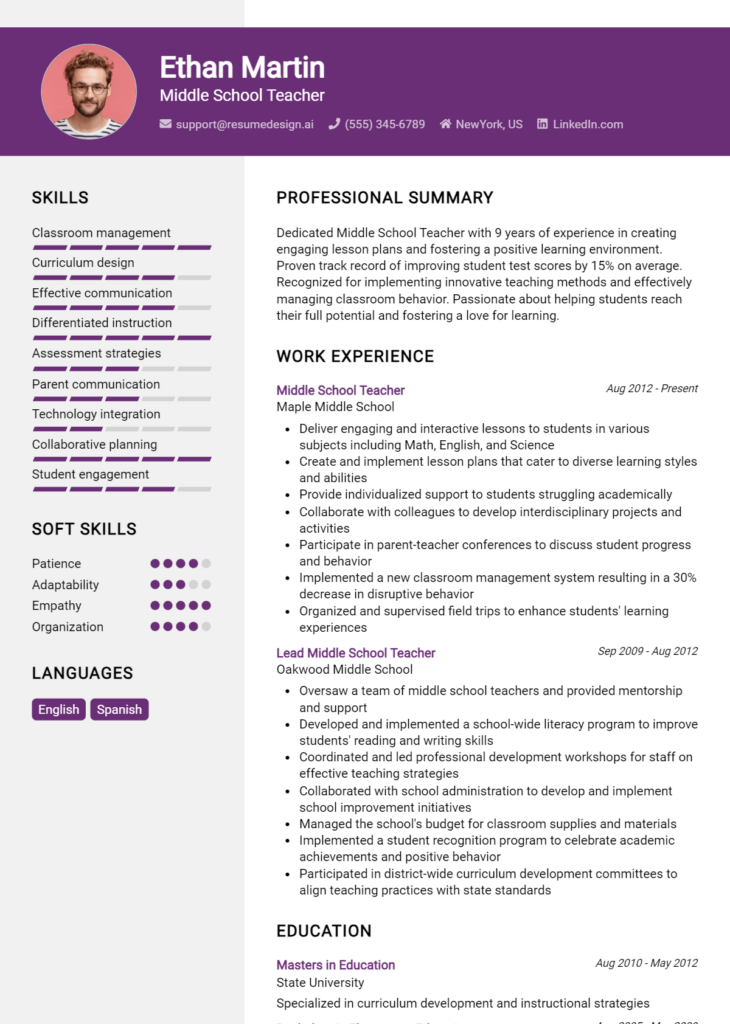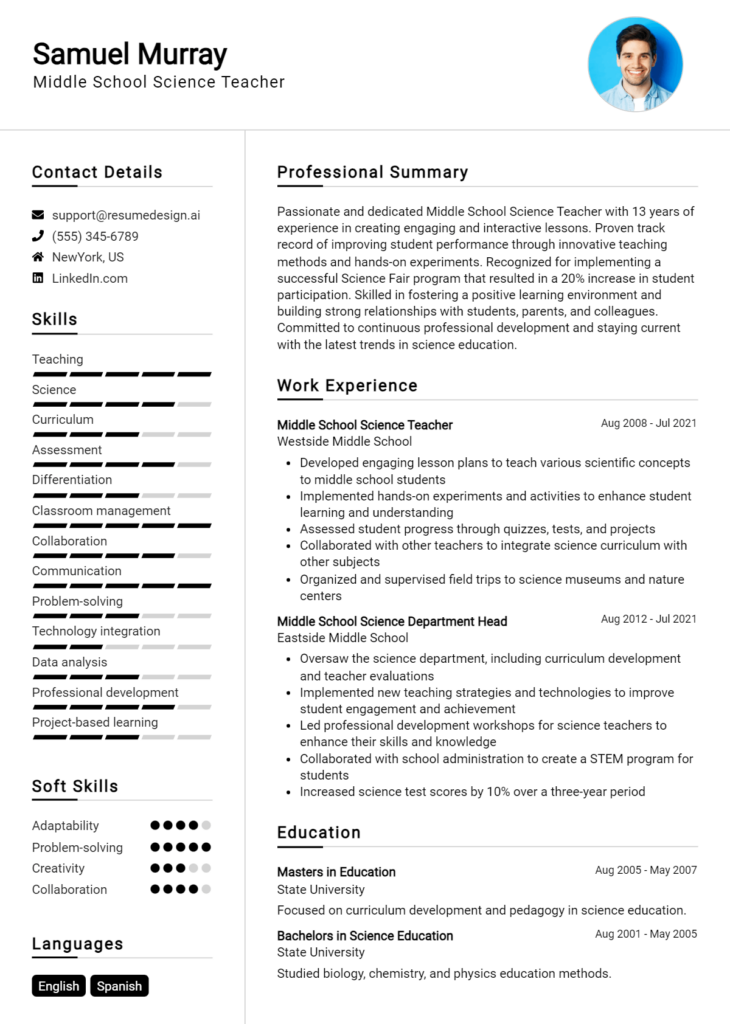Earth Science Teacher Core Responsibilities
An Earth Science Teacher plays a crucial role in educating students about the planet and its systems, bridging science, technology, and environmental studies. Key responsibilities include developing lesson plans, conducting experiments, and fostering critical thinking in students. Strong technical, operational, and problem-solving skills are essential to effectively communicate complex concepts and engage students. These competencies not only enhance the learning experience but also align with the educational goals of the institution. A well-structured resume can effectively showcase these qualifications, demonstrating the teacher's ability to contribute meaningfully to the academic community.
Common Responsibilities Listed on Earth Science Teacher Resume
- Develop and implement engaging earth science curricula that meet educational standards.
- Conduct laboratory experiments and field studies to enhance practical understanding.
- Assess student progress through tests, quizzes, and project evaluations.
- Utilize technology to enhance learning experiences and classroom management.
- Foster a collaborative classroom environment to encourage student participation.
- Integrate interdisciplinary approaches by connecting earth science with other subjects.
- Guide students in developing research and critical thinking skills.
- Communicate effectively with parents and staff regarding student progress.
- Stay updated on current trends in earth sciences and educational methods.
- Participate in professional development to enhance teaching strategies.
- Organize and lead field trips to reinforce classroom learning.
- Encourage environmental stewardship and awareness among students.
High-Level Resume Tips for Earth Science Teacher Professionals
A well-crafted resume is essential for Earth Science Teacher professionals as it serves as the first impression that candidates make on potential employers. In a competitive job market, your resume needs to effectively showcase not only your teaching skills but also your passion for earth sciences and your achievements in the field. A strong resume should reflect your unique qualifications and experiences, making it easier for hiring managers to see why you are the best fit for their institution. This guide will provide practical and actionable resume tips specifically tailored for Earth Science Teacher professionals, helping you stand out in your job search.
Top Resume Tips for Earth Science Teacher Professionals
- Tailor your resume to each job description by highlighting relevant keywords and skills mentioned in the posting.
- Showcase your teaching experience, including specific subjects taught and the grade levels you have worked with.
- Quantify your achievements with specific data, such as student test score improvements or successful project outcomes.
- Highlight industry-specific skills such as knowledge of geology, meteorology, and environmental science, as well as your competency with scientific tools and technology.
- Include any relevant certifications, such as a teaching license or specialized training in earth science education.
- Demonstrate your commitment to professional development by listing workshops, courses, or conferences attended.
- Incorporate any extracurricular activities or initiatives you've led, such as science fairs or environmental clubs.
- Use action verbs to convey your responsibilities and achievements, making your contributions more impactful.
- Keep the layout clean and professional, using clear headings and bullet points for easy readability.
- Proofread your resume thoroughly to eliminate any grammatical errors or typos that could detract from your professionalism.
By implementing these tips, you can significantly enhance your resume, increasing your chances of landing a job in the Earth Science Teacher field. A well-structured and targeted resume will not only showcase your qualifications but also demonstrate your commitment to education and your passion for earth sciences, making you a standout candidate in the eyes of potential employers.
Why Resume Headlines & Titles are Important for Earth Science Teacher
In the competitive field of education, particularly for an Earth Science Teacher, a compelling resume headline or title is essential for making a strong first impression. A well-crafted headline can immediately capture the attention of hiring managers by summarizing a candidate's key qualifications in a single impactful phrase. It serves as a quick reference point that showcases the applicant's expertise and alignment with the specific requirements of the job. To be effective, the headline should be concise, relevant, and tailored to the role being applied for, ensuring that it resonates with the values and goals of the educational institution.
Best Practices for Crafting Resume Headlines for Earth Science Teacher
- Keep it concise: Aim for 5-10 words that clearly convey your expertise.
- Be role-specific: Use language and terminology relevant to Earth Science teaching.
- Highlight your strengths: Focus on unique skills or accomplishments that set you apart.
- Incorporate keywords: Use industry-specific terms that align with the job description.
- Avoid clichés: Steer clear of overused phrases that lack originality.
- Showcase your passion: Reflect your enthusiasm for teaching Earth Science in your headline.
- Use action words: Employ dynamic verbs to convey energy and commitment.
- Tailor for each application: Customize your headline for each job to maximize relevance.
Example Resume Headlines for Earth Science Teacher
Strong Resume Headlines
Dynamic Earth Science Teacher with 10+ Years Experience in Engaging Curriculum Design
Certified Earth Science Educator Committed to Fostering a Passion for Environmental Stewardship
Innovative Earth Science Teacher Specializing in Hands-On Learning and Fieldwork Opportunities
Dedicated Educator with Proven Track Record of Boosting Student Engagement in Earth Science
Weak Resume Headlines
Teacher Looking for a Job
Experienced Professional Seeking Employment in Education
Strong headlines are effective because they communicate specific expertise and passion, making the candidate stand out in a crowded applicant pool. They clearly articulate a unique value proposition that aligns with the needs of the hiring institution. In contrast, weak headlines fail to impress because they lack specificity and originality, leaving hiring managers with little to distinguish one candidate from another. By avoiding generic titles, applicants can significantly enhance their chances of being noticed and considered for the role.
Writing an Exceptional Earth Science Teacher Resume Summary
A well-crafted resume summary is essential for an Earth Science Teacher as it serves as the first impression for hiring managers. A strong summary succinctly highlights key skills, relevant experience, and notable accomplishments, allowing potential employers to quickly assess a candidate's suitability for the role. It should be concise yet impactful, tailored specifically to the job description, and designed to capture attention immediately. This initial paragraph sets the tone for the rest of the resume, making it critical for candidates to refine this section carefully.
Best Practices for Writing a Earth Science Teacher Resume Summary
- Quantify Achievements: Use specific numbers or outcomes to illustrate your impact (e.g., "increased student engagement by 30%").
- Focus on Relevant Skills: Highlight skills that directly relate to the Earth Science teaching role, such as curriculum development or laboratory management.
- Tailor the Summary: Customize the summary for each job application by aligning it with the specific requirements listed in the job description.
- Be Concise: Keep the summary to 3-5 sentences, ensuring clarity and brevity while delivering key information.
- Use Action Verbs: Start sentences with strong verbs to convey energy and proactivity (e.g., "Developed," "Implemented").
- Showcase Passion: Convey enthusiasm for teaching and Earth Science to demonstrate your commitment to education.
- Highlight Professional Development: Mention any certifications, workshops, or courses relevant to Earth Science education.
- Incorporate Keywords: Use industry-relevant keywords to enhance visibility in applicant tracking systems (ATS).
Example Earth Science Teacher Resume Summaries
Strong Resume Summaries
Dedicated Earth Science Teacher with over 8 years of experience in fostering a love for science among middle school students. Achieved a 25% increase in student test scores by implementing interactive lesson plans and integrating technology into the classroom.
Innovative educator skilled in curriculum development and laboratory management, with a proven track record of enhancing student engagement by 35%. Passionate about using hands-on experiments to deepen understanding of Earth processes.
Results-oriented Earth Science Teacher, recognized for developing a state-wide award-winning curriculum that improved student participation by 40%. Committed to creating inclusive and stimulating learning environments.
Weak Resume Summaries
Experienced teacher looking for a position in Earth Science education.
I have taught various subjects and am interested in Earth Science.
The strong resume summaries effectively highlight specific achievements, relevant skills, and quantifiable outcomes, making them compelling and tailored to the Earth Science teaching role. In contrast, the weak summaries lack detail, specificity, and measurable results, which fails to demonstrate the candidate's qualifications and may not capture the attention of hiring managers.
Work Experience Section for Earth Science Teacher Resume
The work experience section of an Earth Science Teacher resume is crucial as it serves as a platform to showcase the candidate's technical skills, ability to manage diverse teams, and deliver high-quality educational products. This section not only highlights the hands-on experience gained in previous roles but also emphasizes the candidate's achievements, which should be quantified wherever possible. Aligning past experiences with industry standards and expectations is essential to demonstrate the candidate's readiness and capability to contribute effectively to a school’s science department.
Best Practices for Earth Science Teacher Work Experience
- Highlight technical expertise in Earth science and related fields.
- Quantify achievements with specific metrics, such as student performance improvements or project completion rates.
- Demonstrate collaboration with other educators, staff, and community stakeholders.
- Showcase innovative teaching methods or curriculum development initiatives.
- Include relevant certifications or professional development courses undertaken.
- Emphasize leadership roles, such as leading a science club or organizing educational workshops.
- Align experience descriptions with current educational standards and practices.
- Use action verbs to convey a sense of initiative and impact in each role.
Example Work Experiences for Earth Science Teacher
Strong Experiences
- Developed and implemented a new Earth Science curriculum that increased student engagement by 30%, resulting in a 15% improvement in standardized test scores.
- Led a team of 5 teachers in a cross-disciplinary project that integrated Earth Science with environmental education, fostering collaboration and increasing student participation in science fairs by 40%.
- Organized and facilitated annual field trips to local geological sites, enhancing real-world learning experiences for over 200 students and receiving positive feedback from 95% of participants.
- Conducted professional development workshops for 20+ faculty members on integrating technology into Earth Science lessons, improving overall teaching effectiveness across the department.
Weak Experiences
- Taught Earth Science classes.
- Participated in various school activities.
- Helped students with their science projects.
- Attended staff meetings and contributed to discussions.
The examples labeled as "strong" are considered effective because they provide specific, quantifiable outcomes that demonstrate the candidate's ability to impact student learning and foster collaboration. They articulate clear achievements and leadership roles, showcasing the candidate's technical expertise and commitment to education. In contrast, the "weak" examples are vague and lack measurable results or detailed contributions, making it difficult for potential employers to gauge the candidate's effectiveness or initiative in their previous roles.
Education and Certifications Section for Earth Science Teacher Resume
The education and certifications section of an Earth Science Teacher resume is crucial as it underscores the candidate's academic background, industry-relevant certifications, and commitment to continuous learning. This section not only showcases formal qualifications but also highlights specialized training and relevant coursework that can significantly enhance the candidate's credibility and alignment with the job role. By meticulously detailing educational achievements and certifications, candidates can effectively demonstrate their preparedness to teach complex scientific concepts, engage students in meaningful learning experiences, and contribute positively to the academic environment.
Best Practices for Earth Science Teacher Education and Certifications
- Include your highest degree first, emphasizing majors or minors relevant to Earth Science.
- List industry-recognized certifications, such as National Board Certification or state-specific teaching licenses.
- Provide specific coursework that relates directly to Earth Science, including geology, meteorology, or environmental science.
- Highlight any specialized training or workshops attended that enhance teaching methods or Earth Science knowledge.
- Use clear and concise language to describe educational qualifications, avoiding jargon that may not be universally understood.
- Indicate ongoing professional development efforts, such as conferences or additional certifications in science education.
- Prioritize relevance; only include degrees and certifications that are pertinent to the teaching position.
- Ensure all dates and institutions are accurate and presented in a consistent format.
Example Education and Certifications for Earth Science Teacher
Strong Examples
- M.S. in Earth Science Education, University of XYZ, 2022
- B.S. in Geology, University of ABC, 2020
- National Board Certified Teacher in Early Adolescence Science, 2023
- Certified Environmental Educator, Environmental Protection Agency, 2021
Weak Examples
- Ph.D. in Philosophy, University of DEF, 2015 (not relevant to Earth Science)
- Certification in Computer Programming, 2018 (not related to teaching Earth Science)
- B.A. in English Literature, University of GHI, 2013 (not applicable to science education)
- High School Diploma, 2000 (not sufficient for teaching position)
The strong examples are considered effective because they directly relate to the requirements of teaching Earth Science, showcasing relevant degrees and recognized certifications that enhance the candidate's qualifications. In contrast, the weak examples demonstrate a lack of relevance to the Earth Science teaching role, with degrees and certifications that do not align with the subject matter or teaching credentials needed in the field. This distinction helps hiring committees quickly assess a candidate's suitability for the position based on their educational background and certifications.
Top Skills & Keywords for Earth Science Teacher Resume
In crafting a compelling resume for an Earth Science Teacher position, highlighting the right skills is crucial. These skills not only demonstrate your proficiency in teaching complex scientific concepts but also reflect your ability to engage students and foster a positive learning environment. A well-structured resume that emphasizes both hard and soft skills can set you apart from other candidates, showcasing your qualifications and commitment to education. For a comprehensive overview of essential skills, explore this skills guide, and remember that your work experience is equally important in illustrating your journey as an educator.
Top Hard & Soft Skills for Earth Science Teacher
Soft Skills
- Strong communication skills
- Enthusiastic and engaging teaching style
- Patience and adaptability
- Critical thinking and problem-solving
- Classroom management
- Collaboration and teamwork
- Empathy and emotional intelligence
- Time management
- Creativity in lesson planning
- Conflict resolution skills
- Cultural competence
- Motivation and encouragement
- Flexibility in teaching methods
- Active listening
- Positive reinforcement techniques
Hard Skills
- Proficiency in earth science content
- Knowledge of scientific research methods
- Familiarity with educational technology tools
- Curriculum development and implementation
- Data analysis and interpretation
- Laboratory safety and procedures
- Assessment and evaluation techniques
- Geographic Information Systems (GIS)
- Environmental science principles
- Knowledge of state and national science standards
- Experience with fieldwork and outdoor education
- Understanding of meteorological principles
- Proficient in using digital teaching resources
- Skills in creating multimedia presentations
- Ability to conduct scientific experiments
- Knowledge of geology, oceanography, and astronomy
- Familiarity with climate change and sustainability issues
Stand Out with a Winning Earth Science Teacher Cover Letter
Dear [Hiring Manager's Name],
I am writing to express my enthusiasm for the Earth Science Teacher position at [School Name] as advertised on [where you found the job listing]. With a Bachelor’s degree in Earth Science and over five years of teaching experience in diverse educational settings, I am eager to bring my passion for the Earth sciences and my commitment to fostering a dynamic learning environment to your esteemed institution. My hands-on approach to teaching encourages students to engage deeply with the material and develop a lasting appreciation for our planet and its processes.
In my previous role at [Previous School Name], I designed and implemented an engaging curriculum that integrated field studies, laboratory experiments, and technology-based learning. I believe that experiential learning is crucial in Earth Science, and I have organized several successful field trips that allowed students to observe geological formations and ecosystems firsthand. By incorporating real-world applications into my lessons, I strive to spark curiosity and critical thinking among students, enabling them to connect classroom concepts to their everyday lives. Additionally, my commitment to differentiated instruction ensures that all students, regardless of their learning styles or abilities, can thrive in my classroom.
I am particularly drawn to the innovative teaching methods and collaborative environment at [School Name]. I admire your commitment to sustainability and community engagement, and I am excited about the opportunity to contribute to your programs that promote environmental stewardship. I am also keen to collaborate with fellow educators to enhance interdisciplinary learning experiences, allowing students to see the interconnectedness of Earth science with other subjects such as biology, chemistry, and geography.
Thank you for considering my application. I am looking forward to the opportunity to discuss how my skills and experiences align with the goals of [School Name]. I am excited about the possibility of inspiring the next generation of Earth scientists and fostering a lifelong love for learning in my students.
Sincerely,
[Your Name]
[Your Contact Information]
Common Mistakes to Avoid in a Earth Science Teacher Resume
When crafting a resume for an Earth Science Teacher position, it's essential to present your qualifications and experiences in a clear and compelling manner. However, many candidates make common mistakes that can hinder their chances of landing an interview. Avoiding these pitfalls will not only enhance your resume's effectiveness but also showcase your professionalism and attention to detail. Here are some common mistakes to steer clear of:
Generic Objective Statement: Using a vague objective that doesn't specify your goals related to Earth Science can make your resume forgettable. Tailor your statement to reflect your passion for teaching and your expertise in Earth Science.
Ignoring Relevant Experience: Failing to highlight teaching experience or relevant coursework in Earth Science can weaken your application. Be sure to emphasize any teaching positions, internships, or volunteer work that showcases your skills in this subject area.
Lack of Specificity: Using broad descriptors like "helped students learn" can be less impactful than specific achievements. Use quantifiable results, such as "improved student test scores by 20% through hands-on experiments."
Overloading with Jargon: While it's important to demonstrate your knowledge of Earth Science, excessive technical jargon can alienate non-specialist readers. Aim for a balance that showcases your expertise without overwhelming the reader.
Neglecting Professional Development: Omitting information about workshops, certifications, or continuing education related to Earth Science can give the impression that you are not committed to staying updated in your field. Include any relevant professional development experiences.
Formatting Issues: A cluttered or inconsistent format can distract from your qualifications. Ensure that your resume is well-organized, easy to read, and uses consistent fonts and headings.
Failing to Customize for Each Application: Sending out the same resume to multiple employers can signify a lack of interest. Customize your resume for each position by highlighting experiences and skills that align with the specific job description.
Not Including a Cover Letter: A resume without a cover letter may miss the opportunity to provide additional context about your passion for teaching Earth Science. Always include a tailored cover letter to complement your resume and explain why you are a strong fit for the role.
Conclusion
As an Earth Science Teacher, it's crucial to convey your passion for the subject and your ability to engage students with the wonders of our planet. Throughout this article, we've explored the essential skills and qualifications required for this role, including a solid understanding of geology, meteorology, oceanography, and environmental science. We've also discussed the importance of effective communication, creativity in lesson planning, and methods for fostering a positive learning environment.
In today's competitive job market, having a standout resume is key to securing your desired position. Make sure your resume showcases your educational background, teaching experience, and unique skills that make you an excellent candidate for an Earth Science Teacher role.
Now is the perfect time to review and enhance your Earth Science Teacher resume. Utilize helpful resources such as resume templates, which can provide a professional layout for your information. Consider using a resume builder to streamline the process and ensure you highlight your strengths effectively. If you need inspiration, browse through resume examples to see how others in your field have presented their qualifications. Additionally, don't overlook the importance of a well-crafted cover letter; check out the cover letter templates available to help you make a strong first impression.
Take action now and elevate your resume to reflect your dedication and expertise as an Earth Science Teacher!

